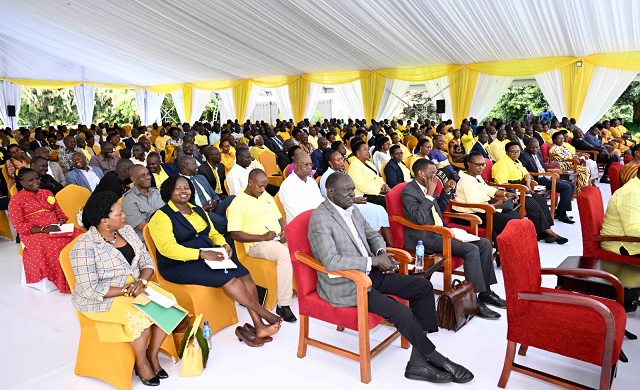
Kampala, Uganda | THE INDEPENDENT | The National Resistance Movement (NRM) Parliamentary Caucus has resolved to support a proposal by the government seeking to introduce stringent amendments to strengthen the anti-corruption legal regime particularly to combat white-collar crime.
White-collar extortion or white-collar crime generally refers to nonviolent financial offenses, such as public corruption, health care fraud, mortgage fraud, securities fraud, embezzlement, tax evasion, money laundering, insider trading, mail and wire fraud, and similar unethical behaviors.
Denis Hamson Obua, the Government Chief Whip, and Chairperson of the Caucus says the President informed the NRM MPs that the Government was in the process of introducing the proposed amendments to strengthen the Anti-Corruption legal regime particularly to fight white-collar extortion.
It is not yet clear what proposed amendments the Government is seeking to introduce to repeal the Anti-Corruption Act 2009. However, a 2020 study by the Anti-Corruption Coalition Uganda – ACCU assessed the status and level of implementation of the Act as amended, and discredited the law citing ‘inherent weaknesses’ that limited the implementation of its provisions.
The study noted that the law lacked a comprehensive witness protection mechanism which has made it difficult to prosecute offenses such as the abuse of office and causing financial loss to the Government. Proving such offences has been challenging rendering the corrupt loopholes to exploit with impunity, contrary to the objectives of the law.
Equally, the report pointed increased risk of duplication and likely wastage of resources by the Inspectorate of Government – IG and the Director of Public Prosecution DPP given their vested mandate of investigating and prosecuting corruption which created redundant overlaps of two bodies that lack the necessary financial and human resources.
Similarly, the report further revealed that penalties provided for in the Act were far more lenient as compared to the gravity of the offenses and the conviction-based asset recovery made it difficult for the state to recover the property secured using proceeds of corruption.
During the five-hour-long meeting at the State House Entebbe on Thursday the Caucus also resolved to support the President’s directive to the Minister of Finance, Planning, and Economic Development to promulgate a statutory instrument to operationalize Section 90 of Tier 4 of the Microfinance and Money Lenders’ Act 2016 within two weeks to control interest rates.
The Caucus resolution comes a week after the Inspectorate of Government led by Beti Kamya Turwomwe submitted to Parliament their Bi-Annual Performance Report indicating a decline in the conviction of corrupt officials from 53 percent to 40 percent between January 2022 and June 2023.
During the period under review, the IG reported that a total of 7.99 billion Shillings was recovered from 3,504 corruption complaints registered. In the same period, 43 convictions were made out of the 92 prosecutions concluded.
In response to the report, the Shadow Cabinet has blamed President Museveni for lacking the political will to fight rampant graft in the country, which they say explains the failure of several government programs to the detriment of social services to the citizens.
According to the 2021 Report of the Inspectorate on the Cost of Corruption the country loses about Shillings 10 trillion, about 23% of the annual national budget every year to corruption. Transparency International ranks Uganda 142 out of 180 countries in the global corruption perception index.
*****
URN
 The Independent Uganda: You get the Truth we Pay the Price
The Independent Uganda: You get the Truth we Pay the Price





